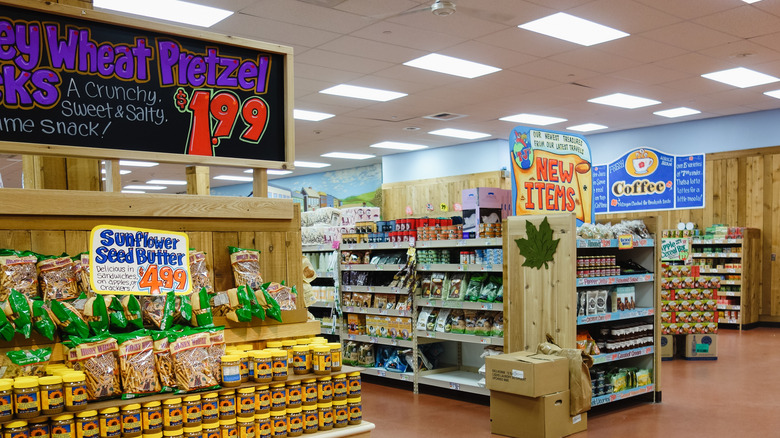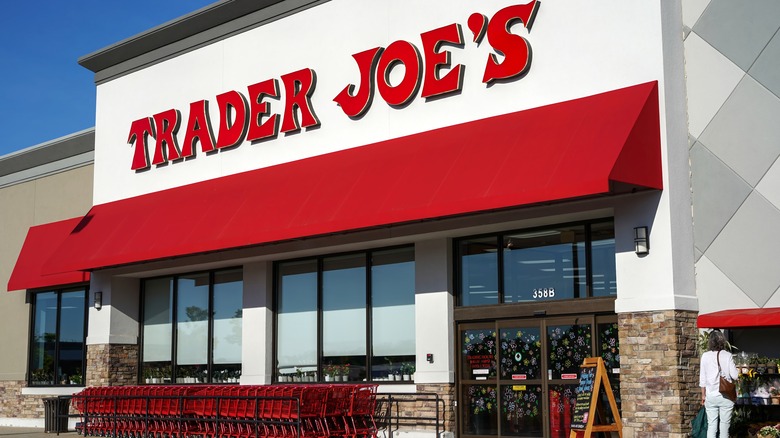Trader Joe's Is Apparently Too Loyal To Implement A Loyalty Program
There is so much to love about Trader Joe's, from the fan-favorite products like Everything Bagel seasoning to its smaller meal prep items that are perfect for cooking for one or two. The quirky and curated grocery chain has earned the approval of bargain shoppers and foodies alike, and its devotees are nothing short of a cult following. There are even social media accounts dedicated to covering all things TJs and with such massive followings, we have to wonder, where does all that loyalty come from?
The allegiance to Trader Joe's is all thanks to the brand's conscious choice to build loyalty through high-quality products, low prices, and customer experience, including some interesting goodwill-building policies. For example, you can try any product you want, as long as it doesn't need to be cooked, to decide if you like it before you buy it, and you can return anything no questions asked. Kids can also get a little treat at the cash register if they find a stuffed animal hidden in the aisles at every location. Because of personal touches like this, and an incredibly friendly staff, in 2022 Chain Store Age reported that Trader Joe's is ranked first in brand intimacy among consumers. Part of the secret to success, however, is what Trader Joe's deliberately doesn't do — namely sales, grocery delivery, online ordering, and loyalty programs.
No gimmicks at TJs
If you're a die-hard Trader Joe's shopper, you can learn a ton about new products, customer choice awards, and seasonal shopping by listening to the official Trader Joe's Podcast. Plus you'll get the inside scoop on how the chain makes a lot of its marketing decisions and store policies. In a January 2023 episode, hosts Tara Miller and Matt Sloan discuss why the chain doesn't have a loyalty program like other grocery store chains, despite being consistently ranked high in customer loyalty. The answer is that its loyalty is to its customers, not to its products. Miller said that the programs are actually sort of deceptive, noting, "The idea is that store is gaining your loyalty by providing you discounts. The discounts are paid for by the manufacturers of the products. So they're paying the store to offer discounts so you'll buy more of their, the [sic] products. It's very convoluted. To me, it sounds anything but something that would engender loyalty."
Trader Joe's also doesn't engage in sales or loyalty programs because they feel that customers appreciate always knowing what their prices are and that anybody who walks into the store can get the lowest price — you don't have to be a member of anything. Incentives like loyalty programs also actually drive up prices overall because they cost money to implement, not to mention that they collect your personal shopping data.
Low prices are part of the loyalty
"From a business model perspective, those loyalty programs, they're not free," Matt Sloan shares on the podcast. "It costs money and takes lots of time and resources to track all your purchases, to give you a coupon targeted to your interest, to provide a deal that was paid for through a collection of the manufacturers, and maybe even that customer's own money. We're interested in removing costs." Miller added, "And when you shop at Trader Joe's, you know what the prices are gonna be, we don't change our prices unless our costs change."
The team also finds it disingenuous to collect and sell customer data, and as a rule, they only collect data on product sales, not individuals. "We don't collect any data on our customers," says podcast host Tara Miller. "We're not tracking individual customer purchases, but we are tracking whether or not a particular product sells well. And if it doesn't, that's our customers voting with their collective dollars telling us, yeah, that's not something we love."
So instead of building loyalty with points or coupons, Trader Joe's builds what Forbes describes as true loyalty through an emotional connection. The brand counts on building repeat business by taking care of its shoppers and offering great products at affordable prices. It's a pretty old-fashioned system, but this simplicity seems to be the key to the brand's success.


